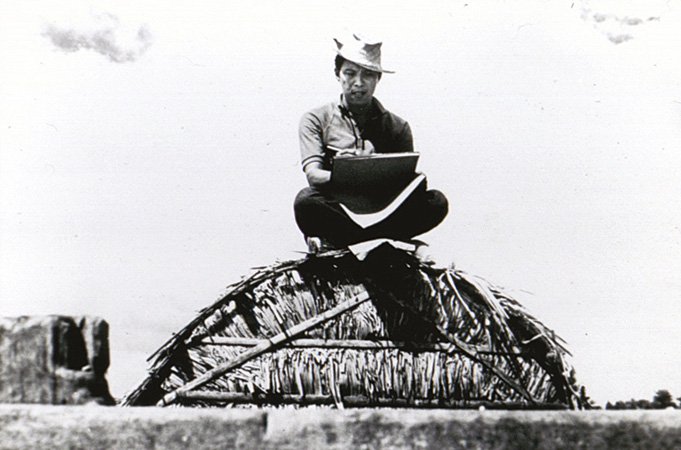Cultural Center of the Philippines
ENCYCLOPEDIA OF
PHILIPPINE ART
Botong Francisco, Series No. 21
Circa 1962 / Black-and-white prints / 39 x 58.5 centimetres / Artist: Dick Baldovino / Cultural Center of the Philippines Collection
Baldovino began his photographic career in 1957 as a photojournalist, developed mastery of the photo-essay, and gained popularity for magazine coverage of celebrity artists. A Baldovino portrait is characterized by the photojournalist’s keen ability to picture realism and habitual concern to depict candidness or spontaneity, even if the image is taken under controlled conditions.
The subject is painter Carlos (Botong) Francisco (later National Artist for visual arts), whom Baldovino first met on the set of Gerardo de Leon’s movie Noli Me Tangere (Touch Me Not). As art director, Botong designed sets, costumes, and props for the movie; Baldovino took stills for promotional use.
Chronicling the painter began in 1961 and continued for two years, during which time the photographer sought to create a portfolio capturing the “real” person behind the brushes. “I consider my photographs of him like a visual diary, personal, intimate.… [They chronicle] the artist’s many moods while capturing the simple down-to-earth spirit of his genius,” Baldovino explains. Botong was a man of the people, an artist who never left his rural, lakeshore hometown of Angono.
Baldovino sought to portray Botong’s unique, disarming lack of affectation. This black-and-white photograph shows a full, unposed figure sitting tailor-fashion on the grass roof of a native boat and sketching Angono’s Bae Lake. It is the painter, devoid of self-consciousness, comfortable and totally absorbed in his aesthetic pursuit.
The singular character and style of the subject is captured not through a close-up of facial features but by a study of the painter’s true-to-life working situation. One remembers Botong as close to the commonplace and the common folk through Baldovino’s masterful combination of pose, clothing, and setting. This is a fine example of environmental portraiture—capturing the subject in its milieu.
Written by Felice P. Sta. Maria (1994)
